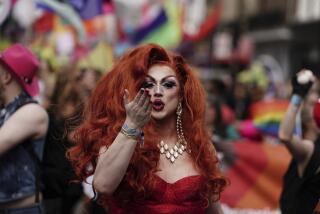10 Anti-Whaling Demonstrators Arrested on St. Kitts
- Share via
FRIGATE BAY, St. Kitts and Nevis — Greenpeace activists buzzed ashore Tuesday in motorized rubber boats to plant cardboard tombstones on the beach in protest of the killing of nearly 2,000 whales a year despite a global ban on commercial whaling.
St. Kitts police officers, some armed with tear gas and machine guns, quickly arrested the 10 activists, though the protest was peaceful. They were expected to be held overnight and face a magistrate in the morning on charges of obstructing police officers and resisting arrest.
The demonstration was aimed at spotlighting and denouncing what Japan says is whaling for scientific research as well as the support Tokyo has won from smaller countries here at the International Whaling Commission’s annual meeting.
Coming a day after the IWC acknowledged that whaling opponents have a right to peacefully protest, the action outside the hotel where the organization was wrapping up its five-day meeting showed renewed defiance among the anti-whaling forces who suffered a symbolic setback earlier in the session.
For the first time since the IWC imposed a moratorium on whaling in 1986 to protect species on the verge of extinction, a majority of members voted Sunday in favor of eventual resumption of commercial whaling.
St. Kitts and Nevis, host of this year’s IWC meeting, joined five other Caribbean countries and about 20 developing states in Africa and the South Pacific to give Japan a one-vote majority on the nonbinding resolution.
The vote has no real influence on whaling because Japan and Iceland exploit a loophole that allows the killing of the mammals in the name of scientific research. Norway ignores the ban altogether.
“While we’re all focused here on when and whether Japan will take over the IWC, they’re headed to the Antarctic sanctuary to slaughter another thousand whales,” said Greenpeace spokesman Mike Townsley as nine fellow activists shed life preservers and began planting black cardboard whale flukes scrawled with “RIP.”
Several St. Kitts police officers descended on the protesters, wrestling them to the ground and stomping on the cardboard tombstones, which they deemed contraband because they had not arrived through a legal port. They summoned more than a dozen reinforcements, including flak-jacketed riot police officers and muscular young men without uniforms.
Two black Zodiacs bearing the name Greenpeace on their sides had carried nine protesters and the cardboard markers across about a mile of water from the group’s vessel Arctic Sunrise. The former sealing ship was involved in a collision with a Japanese whaler in January, prompting St. Kitts authorities to bar it from entering Basseterre harbor last week on grounds that it was a threat to national security.
“A threat to national secrecy, maybe,” said Patrick Ramage, spokesman for the International Fund for Animal Welfare, as he watched police push the protesters onto the ground, cinch their wrists with plastic cuffs, then pull them up by their hair or bound forearms.
Townsley, who had stayed on shore to summon media coverage of the protest, was arrested with the other nine for what Sgt. Lionel Moore of the St. Kitts police said was “obstruction.”
Asked why the demonstrators were being arrested when they had come to this Caribbean island legally through the airport, Moore said their importation of the cardboard signs was a customs violation.
“When garbage washes up on shore, we take it to the dump,” he said of the protesters.
More to Read
Sign up for Essential California
The most important California stories and recommendations in your inbox every morning.
You may occasionally receive promotional content from the Los Angeles Times.











